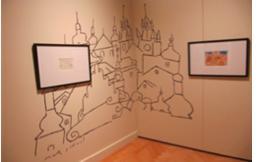by Zachary Levine, Assisant Curator and Jacob Wisse, Director, Yeshiva University Museum, one of five partners of the Center for Jewish History
 A series of new textiles, commissioned from New York-based artist Mark Podwal for Prague’s celebrated Altneuschul (Old-New Synagogue), is the focus of an exhibition at Yeshiva University Museum, Old and the New (November 27, 2011–January 15, 2012). The oldest continuously-active synagogue in the world, the Altneuschul, completed in 1270, is recognized for its architectural beauty and as a symbol of Czech-Jewish identity. Embroidered in gold thread on rich velvet, the textiles represent the first major commission for the sanctuary of the Prague shul in over 70 years, merging a contemporary artistic aesthetic with traditional Czech-Jewish art. The YU Museum is privileged to unveil the textiles before they are shipped to Prague to be installed and dedicated in spring 2012.
A series of new textiles, commissioned from New York-based artist Mark Podwal for Prague’s celebrated Altneuschul (Old-New Synagogue), is the focus of an exhibition at Yeshiva University Museum, Old and the New (November 27, 2011–January 15, 2012). The oldest continuously-active synagogue in the world, the Altneuschul, completed in 1270, is recognized for its architectural beauty and as a symbol of Czech-Jewish identity. Embroidered in gold thread on rich velvet, the textiles represent the first major commission for the sanctuary of the Prague shul in over 70 years, merging a contemporary artistic aesthetic with traditional Czech-Jewish art. The YU Museum is privileged to unveil the textiles before they are shipped to Prague to be installed and dedicated in spring 2012.

The textiles, including a Torah ark cover, three Torah mantles, and covers for the Torah reading and cantor’s desks, will be used on a daily basis in the sanctuary of the synagogue. Podwal melds imagery from Jewish Prague’s physical landscape with that based on the mythology of the city and the synagogue. At the core of Old and the New is the Altneuschul itself, the historical center of Prague’s Jewish community. Complementing the textiles are the YU Museum’s historic scale model of the synagogue and a selection of Podwal’s earlier graphic work of Prague.
 Imagery from the synagogue that is evoked in the textiles includes: the Maisel Flag, which symbolized the Prague Jewish community’s civil and financial autonomy under the Habsburg monarchy; and the Old City of Jerusalem with the Altneuschul standing in for the ancient Temple. Indeed, the name Altneuschul, in addition to “Old-New,” invokes the phrase al tnai, “on condition,” a reference to the legend that angels transported the synagogue’s stones to Prague from the destroyed Jerusalem Temple, on condition that they be returned and reincorporated into the Temple structure when it is rebuilt.
Imagery from the synagogue that is evoked in the textiles includes: the Maisel Flag, which symbolized the Prague Jewish community’s civil and financial autonomy under the Habsburg monarchy; and the Old City of Jerusalem with the Altneuschul standing in for the ancient Temple. Indeed, the name Altneuschul, in addition to “Old-New,” invokes the phrase al tnai, “on condition,” a reference to the legend that angels transported the synagogue’s stones to Prague from the destroyed Jerusalem Temple, on condition that they be returned and reincorporated into the Temple structure when it is rebuilt.

While the textiles evoke and reference the synagogue’s rich past, they also highlight the artist’s creative appropriation of symbols, as well as the remarkable contemporary sewing techniques that went into bringing Podwal’s designs to life in fabric. They represent a true blending of the Old and the New.
Click here to view images from the embroideries and the exhibition.
Old and the New will be on view through January 15, 2012.
